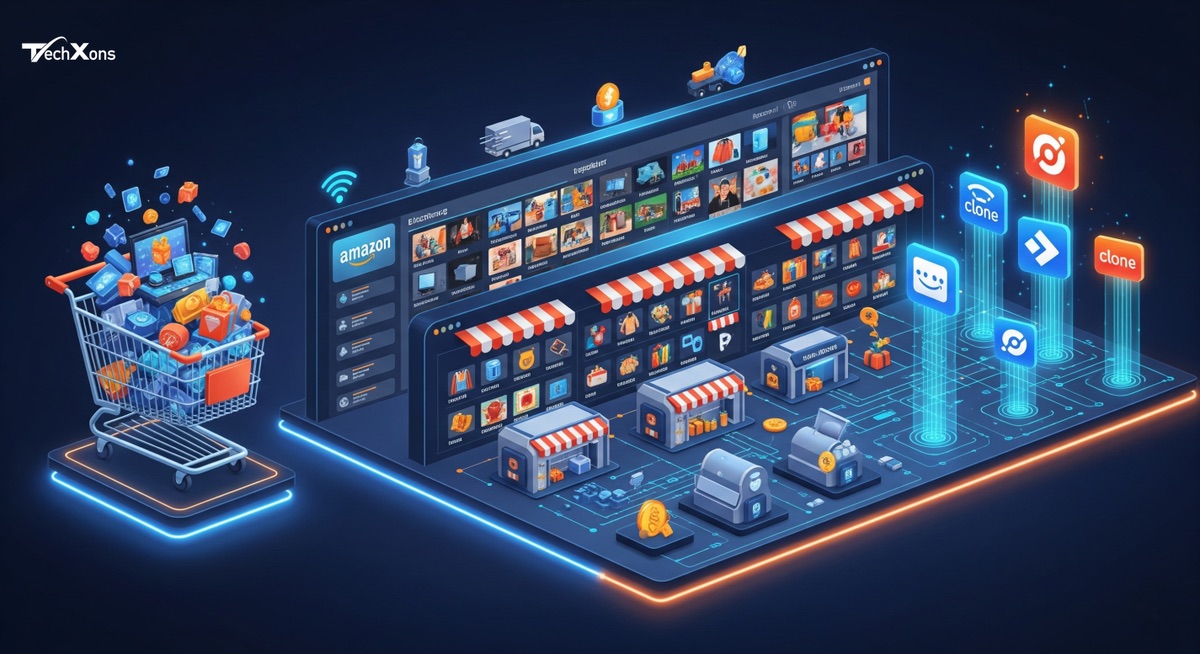Unlocking E-Commerce Dominance: The Rise of Amazon Clones in the Digital Marketplace
This article traces Amazon's evolution from an online bookstore to a trillion-dollar e-commerce leader, highlighting its customer-centric features, AI-driven personalization, and logistics innovations like FBA. It dissects key elements of Amazon's model—user interfaces, payments, reviews, and seller tools—while predicting future trends in AI, supply chain optimization, voice search, AR shopping, and sustainability. For startups, it emphasizes the advantages of Amazon clones provided by companies like Techxons, offering customizable platforms for niche markets, global expansion, and efficient launches. Challenges, case studies, and a step-by-step guide to implementation are included, positioning Amazon clones as accessible pathways to e-commerce success.
In the fast-moving world of online shopping, Amazon has truly made its mark as the leading force, changing the way we buy, sell, and receive products. Starting out as a simple online bookstore, it has grown into a massive global powerhouse that offers everything from electronics to groceries. This incredible journey has inspired many entrepreneurs to follow in its footsteps. But what if you could achieve similar success without having to start from the ground up? That’s where the idea of an Amazon clone comes in—a flexible, ready-to-go platform that replicates Amazon's features while giving you the freedom to add your own branding and innovations. For companies like Techxons, which focus on delivering high-quality solution clones, this is a fantastic opportunity for startups and businesses to dive into the e-commerce world with less risk and greater potential.
This detailed article takes a closer look at Amazon's journey, its key business strategies, the technological advancements that have fueled its success, and what the future might hold. We’ll discuss how an Amazon clone can empower new online marketplaces, providing valuable insights for anyone looking to launch or grow their e-commerce business. Whether you’re a seller considering the Amazon clone model or a developer in search of fresh ideas, grasping this ecosystem is essential for thriving in today’s digital marketplace. Terms like "Amazon clone" aren’t just trendy phrases; they’re gateways to organic search traffic and long-term growth.
Amazon's Journey: From Books to Billions
The story of Amazon is a brilliant example of innovation and growth. Founded by Jeff Bezos in 1994 as an online bookstore operating out of his garage, Amazon quickly branched out from books to become the "everything store." By 1997, it had gone public, and today, it boasts a valuation of over $1.5 trillion, employing millions around the globe and serving hundreds of millions of customers.
At the core of Amazon's success is its focus on the customer. Features like one-click purchasing, tailored recommendations, and Prime membership have set the bar high in the industry. The concept of an Amazon clone takes a page from this playbook, enabling new platforms to adopt these successful strategies.
Key Features That Define Amazon's Business Model
If you're looking to create a successful Amazon clone, it's essential to break down what makes Amazon tick:
1. User-Friendly Interface and Search Functionality
Amazon's homepage is designed to be intuitive, showcasing categories, deals, and search bars right up front. Their advanced search algorithms leverage AI to recommend products based on what you've browsed before. For an Amazon clone, incorporating similar machine learning for personalized recommendations can really help boost those conversion rates.
2. Personalized Shopping Experience
Thanks to data analytics, Amazon crafts a shopping experience that's tailored just for you—think of features like "Frequently bought together" or "Customers who viewed this also viewed." An Amazon clone can enhance user engagement by implementing profiles and wish lists to mimic this personalized touch.
3. Secure Payment and Checkout
Amazon's smooth checkout process, which includes options like Amazon Pay, helps minimize cart abandonment. Clones should prioritize robust payment gateways that support various currencies and methods, ensuring PCI compliance to build trust with users.
4. Reviews and Ratings System
User-generated content is key to building credibility. Amazon's verified purchase badges help keep fake reviews at bay. An Amazon clone should include moderation tools to ensure authenticity and maintain trust.
5. Mobile Optimization
With more than half of e-commerce traffic coming from mobile devices, Amazon's app is a major player. Clones need to be responsive and consider adding push notifications for deals to keep users engaged.
6. Seller Dashboard and Tools
Sellers benefit from analytics, advertising options, and dispute resolution tools. Techxons' Amazon clone solutions often come pre-loaded with these features, and they can be customized for specific niches like fashion or electronics.
The Role of AI and Technology in Amazon's Future
Amazon is leading the charge in AI integration. Their recommendation engine, powered by machine learning, accounts for 35% of sales. Looking ahead, we can expect:
Enhanced Personalization
By 2027, AI might be able to anticipate needs even before searches happen, utilizing voice assistants like Alexa. Amazon clones can tap into similar AI capabilities through APIs from providers like Google Cloud.
Supply Chain Optimization
AI helps forecast demand, which can significantly reduce overstock. Plus, with drones and robots in warehouses (like Amazon's Kiva systems), operations can be streamlined for greater efficiency.
Opportunities for Startups with Amazon Clones
Starting an e-commerce site from the ground up can feel overwhelming—development costs can easily soar past $100,000. But with an Amazon clone, you can cut those expenses significantly. Techxons offers ready-to-go solutions: customizable scripts that come packed with features like multi-vendor support, SEO tools, and dropshipping integrations.
Niche Markets
While Amazon casts a wide net, clones can hone in on specific niches—think organic foods or handmade crafts. To attract visitors, optimize for keywords like "Amazon clone for handmade goods."
Global Expansion
These clones are designed to support multiple languages and currencies, making them perfect for tapping into international markets. Plus, you can use geo-targeting to create localized experiences.
Monetization Strategies
Beyond just taking a cut from sales, clones can introduce premium seller plans or ad placements. Techxons even includes affiliate modules to help you maximize revenue.
SEO and Marketing for Amazon Clones
To boost your ranking, make sure to include "Amazon clone" in your titles and meta descriptions. Craft content like "How to Build Your Amazon Clone Business" to earn backlinks. Don’t forget to leverage social media and email marketing to broaden your reach.
Challenges in Building and Running an Amazon Clone
There are legal challenges to navigate: steer clear of trademark issues by customizing your branding. Security is crucial, so protect your site from hacks with encryption. Scalability is key, so consider cloud hosting. And with competition fierce, set yourself apart with unique features like blockchain for authenticity. Ethical AI use is also important—ensure your recommendations are unbiased. Techxons' clones come equipped with compliance tools to help with this.
Case Studies: Successful Amazon-Inspired Platforms
Etsy took inspiration from Amazon's marketplace for crafts and raked in $2.5 billion in revenue. Flipkart in India adapted the model and was later acquired by Walmart. Techxons has assisted clients in launching similar platforms, helping them achieve quick returns on investment.
Step-by-Step Guide to Launching Your Amazon Clone
1. Research Market: Find your niche.
2. Choose Provider: Go with Techxons for dependable clones.
3. Customize: Tailor features and branding to your vision.
4. Integrate Tools: Set up payments and shipping.
5. Test and Launch: Conduct beta tests and fine-tune your SEO.
6. Scale: Analyze your data and look for expansion opportunities.
The Future of E-Commerce: Amazon Clones Leading the Way
Amazon's influence is undeniable, but Amazon clones democratize access. With AI advancements, these platforms will evolve, offering personalized, efficient shopping. For entrepreneurs, partnering with Techxons means turning ideas into reality swiftly.
In conclusion, whether replicating Amazon's vast ecosystem or niching down, an Amazon clone is your shortcut to e-commerce success. Embrace it, and watch your online empire grow.





